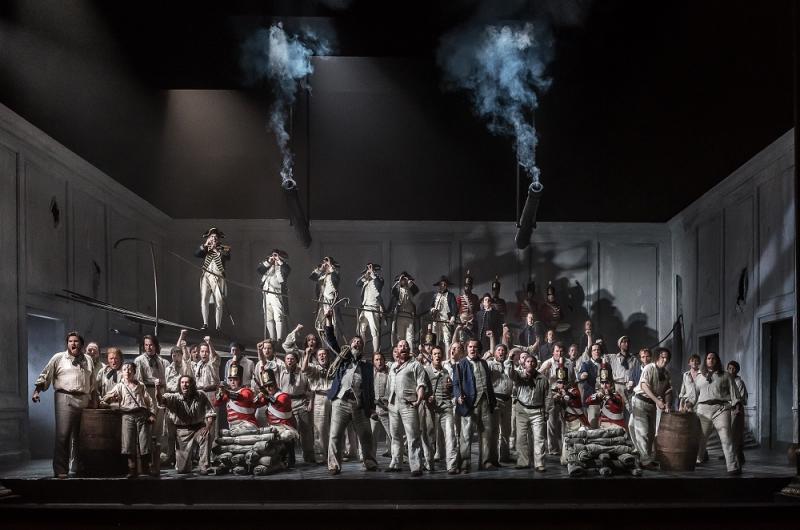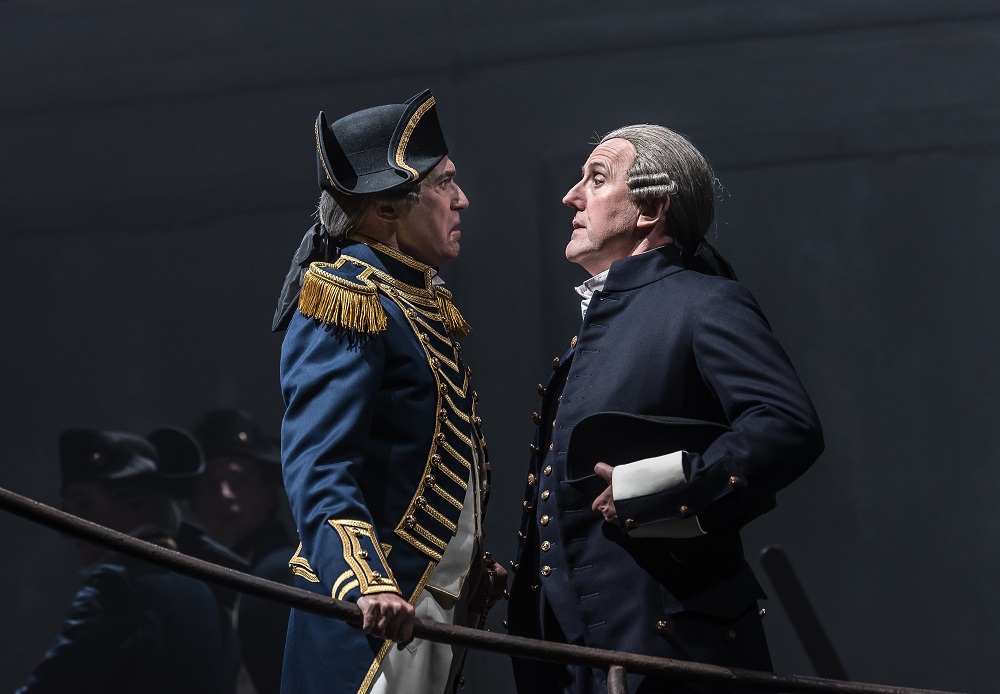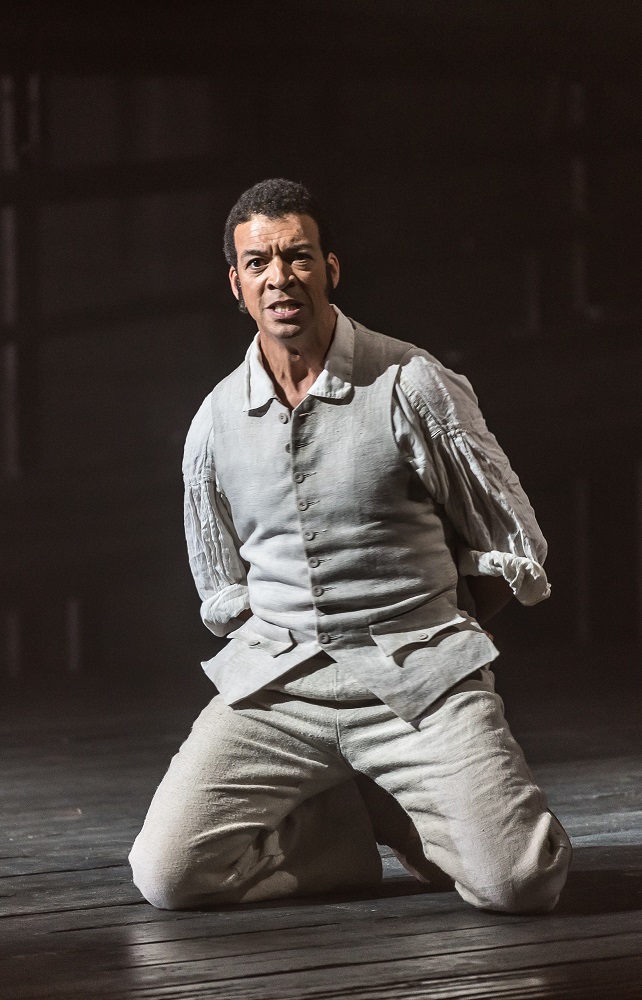Billy Budd, Opera North | reviews, news & interviews
Billy Budd, Opera North
Billy Budd, Opera North
Britten's drama of good and evil at sea lacerates in a strong, simple production

"That cursed mist" may hide the French from the crew of the HMS Indomitable and cause far more deadly damage to moral certainty. But clarity and strength are the assets of Orpha Phelan's new production for Opera North: no gimmicks, superb company work and three principals for the battle of good and evil all equal to their dramatic challenges at a level I haven't seen for decades.
Britten and his co-librettists EM Forster and Eric Crozier pose some challenges in their adaptation of Melville's story, all well handled here: there's a bit too much moralising, especially about avenging angels and the idea that a stammer is a flaw in the divine scheme (well, it does prove fatal, but no-one's to know that in Act One), while the first half - which started out as two separate acts - takes a long time just drawing up the psychological lines of battle. But the screw turns inexorably once beauty-envious Master-at-Arms John Claggart, his "sexuality gone soggy" as Forster put it, accuses press-ganged foundling Billy, goodness personified, of insubordination. That's when upright Captain Vere falls into confusion, and the needle of the moral compass goes spinning.
The opera frames the action with the tortured memories of old Vere, wandering a crumbling mansion of the mind. Its grey walls remain a framework for the action on the ship: no masts and sails here, only hammocks, but Leslie Travers' spiral of splintering planks delineates above and below decks with startling simplicity, his costumes colour-scheme in greys, whites and blues with significant splashes of red, and Thomas C Hase's superb lighting, especially fine on giant shadows, does the rest. There are no surprises other than the famous interlude of major and minor triads - Opera North first trumpet infallibly secure in high-lying notes - when Vere goes to talk to the condemned Budd; usually it's left to the imagination, and the possibility of the "love that dare not speak its name", whereas here the captain goes to sit quietly alongside the able seaman, backs to the audience.
 Phelan, significantly, is the only woman in the company other than movement director Lynne Hockney and some of the orchestral players; she should give us an interesting Don Giovanni where male directors have made too much of the running. She doesn't need to do much other than block effectively and depend on the interaction of fine singing actors.
Phelan, significantly, is the only woman in the company other than movement director Lynne Hockney and some of the orchestral players; she should give us an interesting Don Giovanni where male directors have made too much of the running. She doesn't need to do much other than block effectively and depend on the interaction of fine singing actors.
Each gets his moment in the sun or the dark, even if all three strain on a top note or two - a very small reservation, as they mostly make the problem work for them dramatically. Alastair Miles (pictured above, right, with Alan Oke's Captain Vere), a true world-class bass of the colour the villain needs, has Claggart break out of his stiff public persona to terrifying effect in his monologue of hatred and envy, twisting Billy's red neckerchief in his hands and making a curse over it; for the first time, Garry Walker's razor-sharp Opera North players let rip, too. Goosebumps all round. Alan Oke is perfect of diction and demeanour, too, starting out as a wry, cultured observer of human nature, precise but never prissy, whose breakdown is shocking, both in his climactic soliloquy and in the slow crumpling of his face and body as he conducts Billy's court martial.
 Roderick Williams' innocent who lashes out - not sure (spoiler) why the audience laughed when Claggart is pronounced dead - really is goodness personified, perhaps without the homoerotic element which Phelan downplays. His reactions to everything are strong and true - like Phyllida Lloyd's Opera North Gloriana, this production would be a superb candidate for the close-ups of a film - and his supreme Lieder-singer's subtlety gives us the most cultured and moving "Billy in the Darbies" I've seen or heard (Williams pictured right). It's the first time, other than the Prologue, when a single figure is alone on stage; sailors are symmetrically present forming a cordon around Captain Vere's cabin, Phelan reminding us of the balances in Britten's careful structure.
Roderick Williams' innocent who lashes out - not sure (spoiler) why the audience laughed when Claggart is pronounced dead - really is goodness personified, perhaps without the homoerotic element which Phelan downplays. His reactions to everything are strong and true - like Phyllida Lloyd's Opera North Gloriana, this production would be a superb candidate for the close-ups of a film - and his supreme Lieder-singer's subtlety gives us the most cultured and moving "Billy in the Darbies" I've seen or heard (Williams pictured right). It's the first time, other than the Prologue, when a single figure is alone on stage; sailors are symmetrically present forming a cordon around Captain Vere's cabin, Phelan reminding us of the balances in Britten's careful structure.
Otherwise there are plenty of standouts among the many other grateful roles. Baritone Gavan Ring as the tender friend of the lashed Novice is surely a Billy-in-waiting. Special character comes from Adrian Clarke's Flint, Daniel Norman's Red Whiskers and David Llewellyn's Squeak. Stephen Richardson's Dansker and Oliver Johnston's Novice could yet fine-tune their sympathy, but both are moving.
The final word goes to Vere, whose musical liberation if not the words that go with it makes complete sense in Walker's postponement of the biggest climax to the last well-timed shattering chord. But the male chorus, presumably Opera North's plus extra voices, leaves its mark, too - hard-working, fearless and spine-tingling. This is their moment indeed, as Suor Angelica was for the women; together they will make a huge impact in The Snow Maiden and Turandot, still to come in an Opera North season of vision. The current management of English National Opera, further depriving its own chorus of any significant participation this season by having allegedly just denied them a role in Carousel, should look north to a peerless example of a valued company and hang its head in shame.
rating
Share this article
The future of Arts Journalism
You can stop theartsdesk.com closing!
We urgently need financing to survive. Our fundraising drive has thus far raised £49,000 but we need to reach £100,000 or we will be forced to close. Please contribute here: https://gofund.me/c3f6033d
And if you can forward this information to anyone who might assist, we’d be grateful.

Subscribe to theartsdesk.com
Thank you for continuing to read our work on theartsdesk.com. For unlimited access to every article in its entirety, including our archive of more than 15,000 pieces, we're asking for £5 per month or £40 per year. We feel it's a very good deal, and hope you do too.
To take a subscription now simply click here.
And if you're looking for that extra gift for a friend or family member, why not treat them to a theartsdesk.com gift subscription?
more Opera
 La bohème, Opera North review - still young at 32
Love and separation, ecstasy and heartbreak, in masterfully updated Puccini
La bohème, Opera North review - still young at 32
Love and separation, ecstasy and heartbreak, in masterfully updated Puccini
 Albert Herring, English National Opera review - a great comedy with depths fully realised
Britten’s delight was never made for the Coliseum, but it works on its first outing there
Albert Herring, English National Opera review - a great comedy with depths fully realised
Britten’s delight was never made for the Coliseum, but it works on its first outing there
 Carmen, English National Opera review - not quite dangerous
Hopes for Niamh O’Sullivan only partly fulfilled, though much good singing throughout
Carmen, English National Opera review - not quite dangerous
Hopes for Niamh O’Sullivan only partly fulfilled, though much good singing throughout
 Giustino, Linbury Theatre review - a stylish account of a slight opera
Gods, mortals and monsters do battle in Handel's charming drama
Giustino, Linbury Theatre review - a stylish account of a slight opera
Gods, mortals and monsters do battle in Handel's charming drama
 Susanna, Opera North review - hybrid staging of a Handel oratorio
Dance and signing complement outstanding singing in a story of virtue rewarded
Susanna, Opera North review - hybrid staging of a Handel oratorio
Dance and signing complement outstanding singing in a story of virtue rewarded
 Ariodante, Opéra Garnier, Paris review - a blast of Baroque beauty
A near-perfect night at the opera
Ariodante, Opéra Garnier, Paris review - a blast of Baroque beauty
A near-perfect night at the opera
 Cinderella/La Cenerentola, English National Opera review - the truth behind the tinsel
Appealing performances cut through hyperactive stagecraft
Cinderella/La Cenerentola, English National Opera review - the truth behind the tinsel
Appealing performances cut through hyperactive stagecraft
 Tosca, Royal Opera review - Ailyn Pérez steps in as the most vivid of divas
Jakub Hrůša’s multicoloured Puccini last night found a soprano to match
Tosca, Royal Opera review - Ailyn Pérez steps in as the most vivid of divas
Jakub Hrůša’s multicoloured Puccini last night found a soprano to match
 Tosca, Welsh National Opera review - a great company reduced to brilliance
The old warhorse made special by the basics
Tosca, Welsh National Opera review - a great company reduced to brilliance
The old warhorse made special by the basics
 BBC Proms: The Marriage of Figaro, Glyndebourne Festival review - merriment and menace
Strong Proms transfer for a robust and affecting show
BBC Proms: The Marriage of Figaro, Glyndebourne Festival review - merriment and menace
Strong Proms transfer for a robust and affecting show
 BBC Proms: Suor Angelica, LSO, Pappano review - earthly passion, heavenly grief
A Sister to remember blesses Puccini's convent tragedy
BBC Proms: Suor Angelica, LSO, Pappano review - earthly passion, heavenly grief
A Sister to remember blesses Puccini's convent tragedy
 Orpheus and Eurydice, Opera Queensland/SCO, Edinburgh International Festival 2025 review - dazzling, but distracting
Eye-popping acrobatics don’t always assist in Gluck’s quest for operatic truth
Orpheus and Eurydice, Opera Queensland/SCO, Edinburgh International Festival 2025 review - dazzling, but distracting
Eye-popping acrobatics don’t always assist in Gluck’s quest for operatic truth

Add comment